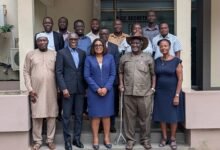
The Ministry of Fisheries and Aquaculture Development has suspended the entrant and registration of new artisanal canoes for three years, effective October 1, 2023.
This is to help regulate the increasing canoe fleet as part of measures to control fishing and aid in the sustainable management and rebuilding of Ghana’s small pelagic stocks.

At a press conference in Accra yesterday, the Sector Minister, Mavis Hawa Koomson said already registered canoes could be replaced when they break down, upon approval by the Fisheries Commission.
She explained that due to the open access to the sea, Ghana’s canoe fleet had shot up from 8,000 in 1990 to more than 12,000 this year, while the small pelagic fish landings, which is the backbone of the artisanal sub sector, had dwindled from 119,000 metric tons in 1990 to 20,000 metric tons in 2022.
For instance, she said the annual landings of Sardinella Aurita declined from 119, 515 tons in 1992 to 11,834 tons in 2019, representing 9.9 per cent of its largest recorded landings.
“Our scientist have informed us that a stock is considered collapsed when it reaches 10 per cent of its highest yields and have therefore concluded that the Sardinella Aurita has collapsed,” she said.
Mrs Koomson said the decline in landings of the small pelagic fishes was affecting the livelihood of more than three million people along the fisheries value chain, compelling some of the fishers to resort to illegal, unreported and unregulated fishing activities to make their expositions profitable, with the socioeconomic impact of this situation being felt already.
She said the suspension of new canoes, to be managed by the Ministry and Fisheries Commission, would be reviewed annually to address all issues that come up.
On the issue of consultation, Mrs Koomson said the ministry had over the last two years engaged stakeholders at all levels, including fishers, boat builders and carvers, traditional authorities.
She said the suspension and other management measure being rolled out were covered by the National Fisheries Management Plan (2022-2026) which was gazzetted in April this year.
The objectives of this management measure, she said included aligning fishing efforts with estimated annual sustainable levels, ending open access regime and full roll out of canoe identification cards, re-characterising canoes by regulating canoes size, gear and motor sizes.
To mitigate the potential negative impact of the measures on fishers, Mrs Koomson said the ministry in collaboration with the USAID funded Ghana Fisheries Recovery Activities was supporting supplementary livelihood interventions designed to attract youth between the ages 15-35 years.
“I will implore all fishers and our stakeholders to commit to intensify engagement on how best to address issues of overcapacity and degradation of the environment in artisanal sector. We must sacrifice today to feed the future,” she said.
The Acting President of the Ghana National Canoe Fishermen Council (GNCFC), Nana Joojo Solomon, commended the Ministry for the introduction of the measure as stakeholders had yearned for it for years.
He said the declining fish stock was not only a food security but a national security threat due to the millions of jobs at stake, should stakeholders watch on for the sector to collapse.
BY JONATHAN DONKOR







